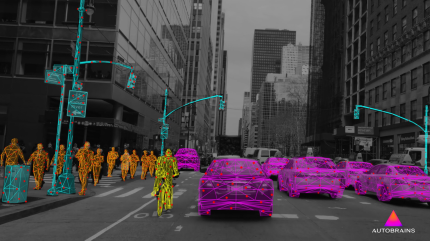
Autonomous driving technology is progressing, presenting itself as an advanced technology that will be shaping the future competitive frontier in the automotive space. However, although the technology is developing amongst OEMs and specialist tech providers, many feel that the technology has a long way to go in the development phase.
From infrastructure, technology support and cybersecurity risks, autonomous driving technology is still facing several hurdles along the way to much wider adoption.

Discover B2B Marketing That Performs
Combine business intelligence and editorial excellence to reach engaged professionals across 36 leading media platforms.
Autobrains, a leading AI company in the automotive industry, says it offers solutions for the next generation of vehicles and mobility – providing safer, superior performance at lower energy consumption and lower cost.
We spoke to Founder and CEO of Autobrains, Igal Raichelgauz, to learn more about the challenges facing autonomous vehicles and to discuss what more can be done to support the development of this advanced technology.

Just Auto (JA): Could you provide some company background?
Igal Raichelgauz (IR): Autobrains is a leading AI company in the automotive industry. Autobrains invented and developed a paradigm-shifting AI technology: Liquid AI – backed by 250+ patents addressing autonomous driving challenges.
Implementing this unique AI technology for ADAS applications disrupts the market with its unprecedented perception capabilities, low compute requirements, and agnosicity to sensors and SoCs.
The company is backed by strategic investors including Temasek, Knorr-Bremse AG, BMW i Ventures, Toyota Ventures, VinFast, Continental AG, and Autel.
What are some of the key challenges facing autonomous vehicles?
The autonomous vehicle industry stands at a crucial juncture, where the path forward is as complex as it is promising. The collective vision of companies like Tesla, Google, and countless technology companies has driven us towards a future where our cars will drive us, rather than the other way around. Yet, this vision remains just that—a vision.
The autonomous vehicle industry stands at a crucial juncture, where the path forward is as complex as it is promising.
Despite the undeniable progress and the billions invested, the full realization of autonomous driving eludes us still, tethered by unresolved technical challenges and the inherent limitations of current technologies. The automotive world has seen remarkable advancements with current AI implementations, but the leap from advanced driver-assistance systems to fully autonomous vehicles is vast and filled with unforeseen complexities.
What more needs to be done to support the development of autonomous drive tech?
The diversity and unpredictability of real-world conditions constitute what we refer to as ‘edge cases’. These scenarios, rare and unforeseen, can derail the most sophisticated AI-driven systems. Current technologies can handle common situations with confidence but falter in the face of the unusual or unexpected.
The industry’s struggle with these edge cases underscores a significant gap in AI’s ability to generalize from training to new, unscripted environments. Autobrains has led to the development of a new kind of AI, Liquid AI, which we see as a leading solution to these dilemmas; it is about evolving our foundational AI paradigms.
How crucial is the role of adaptability with autonomous vehicles?
Without the ability to predict and script edge cases, we require systems that are not only intelligent but also adaptable, capable of self-learning and reasoning in ways that mimic human cognition.






